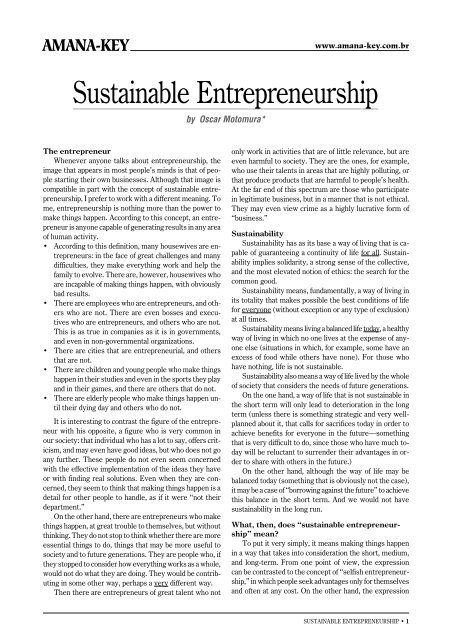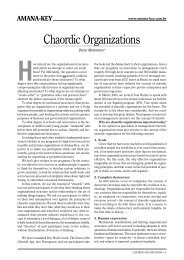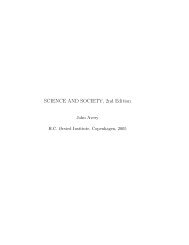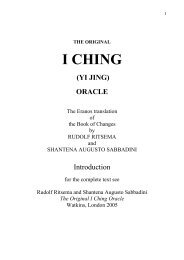Sustainable Entrepreneurship - The Pari Center for New Learning
Sustainable Entrepreneurship - The Pari Center for New Learning
Sustainable Entrepreneurship - The Pari Center for New Learning
You also want an ePaper? Increase the reach of your titles
YUMPU automatically turns print PDFs into web optimized ePapers that Google loves.
www.amana-key.com.br<br />
<strong>Sustainable</strong> <strong>Entrepreneurship</strong><br />
by Oscar Motomura*<br />
<strong>The</strong> entrepreneur<br />
Whenever anyone talks about entrepreneurship, the<br />
image that appears in most people’s minds is that of people<br />
starting their own businesses. Although that image is<br />
compatible in part with the concept of sustainable entrepreneurship,<br />
I prefer to work with a different meaning. To<br />
me, entrepreneurship is nothing more than the power to<br />
make things happen. According to this concept, an entrepreneur<br />
is anyone capable of generating results in any area<br />
of human activity.<br />
• According to this definition, many housewives are entrepreneurs:<br />
in the face of great challenges and many<br />
difficulties, they make everything work and help the<br />
family to evolve. <strong>The</strong>re are, however, housewives who<br />
are incapable of making things happen, with obviously<br />
bad results.<br />
• <strong>The</strong>re are employees who are entrepreneurs, and others<br />
who are not. <strong>The</strong>re are even bosses and executives<br />
who are entrepreneurs, and others who are not.<br />
This is as true in companies as it is in governments,<br />
and even in non-governmental organizations.<br />
• <strong>The</strong>re are cities that are entrepreneurial, and others<br />
that are not.<br />
• <strong>The</strong>re are children and young people who make things<br />
happen in their studies and even in the sports they play<br />
and in their games, and there are others that do not.<br />
• <strong>The</strong>re are elderly people who make things happen until<br />
their dying day and others who do not.<br />
It is interesting to contrast the figure of the entrepreneur<br />
with his opposite, a figure who is very common in<br />
our society: that individual who has a lot to say, offers criticism,<br />
and may even have good ideas, but who does not go<br />
any further. <strong>The</strong>se people do not even seem concerned<br />
with the effective implementation of the ideas they have<br />
or with finding real solutions. Even when they are concerned,<br />
they seem to think that making things happen is a<br />
detail <strong>for</strong> other people to handle, as if it were “not their<br />
department.”<br />
On the other hand, there are entrepreneurs who make<br />
things happen, at great trouble to themselves, but without<br />
thinking. <strong>The</strong>y do not stop to think whether there are more<br />
essential things to do, things that may be more useful to<br />
society and to future generations. <strong>The</strong>y are people who, if<br />
they stopped to consider how everything works as a whole,<br />
would not do what they are doing. <strong>The</strong>y would be contributing<br />
in some other way, perhaps a very different way.<br />
<strong>The</strong>n there are entrepreneurs of great talent who not<br />
only work in activities that are of little relevance, but are<br />
even harmful to society. <strong>The</strong>y are the ones, <strong>for</strong> example,<br />
who use their talents in areas that are highly polluting, or<br />
that produce products that are harmful to people’s health.<br />
At the far end of this spectrum are those who participate<br />
in legitimate business, but in a manner that is not ethical.<br />
<strong>The</strong>y may even view crime as a highly lucrative <strong>for</strong>m of<br />
“business.”<br />
Sustainability<br />
Sustainability has as its base a way of living that is capable<br />
of guaranteeing a continuity of life <strong>for</strong> all. Sustainability<br />
implies solidarity, a strong sense of the collective,<br />
and the most elevated notion of ethics: the search <strong>for</strong> the<br />
common good.<br />
Sustainability means, fundamentally, a way of living in<br />
its totality that makes possible the best conditions of life<br />
<strong>for</strong> everyone (without exception or any type of exclusion)<br />
at all times.<br />
Sustainability means living a balanced life today, a healthy<br />
way of living in which no one lives at the expense of anyone<br />
else (situations in which, <strong>for</strong> example, some have an<br />
excess of food while others have none). For those who<br />
have nothing, life is not sustainable.<br />
Sustainability also means a way of life lived by the whole<br />
of society that considers the needs of future generations.<br />
On the one hand, a way of life that is not sustainable in<br />
the short term will only lead to deterioration in the long<br />
term (unless there is something strategic and very wellplanned<br />
about it, that calls <strong>for</strong> sacrifices today in order to<br />
achieve benefits <strong>for</strong> everyone in the future—something<br />
that is very difficult to do, since those who have much today<br />
will be reluctant to surrender their advantages in order<br />
to share with others in the future.)<br />
On the other hand, although the way of life may be<br />
balanced today (something that is obviously not the case),<br />
it may be a case of “borrowing against the future” to achieve<br />
this balance in the short term. And we would not have<br />
sustainability in the long run.<br />
What, then, does “sustainable entrepreneurship”<br />
mean<br />
To put it very simply, it means making things happen<br />
in a way that takes into consideration the short, medium,<br />
and long-term. From one point of view, the expression<br />
can be contrasted to the concept of “selfish entrepreneurship,”<br />
in which people seek advantages only <strong>for</strong> themselves<br />
and often at any cost. On the other hand, the expression<br />
SUSTAINABLE ENTREPRENEURSHIP • 1
www.amana-key.com.br<br />
can also be contrasted to “unconscious entrepreneurship,”<br />
in which a non-sustainable way of life is produced—a destructive<br />
way of living that generates imbalances of all kinds.<br />
At this point in our discussion, the key question emerges<br />
clearly: how can sustainable entrepreneurship help to develop<br />
Brazil To what degree is this concept fundamental<br />
to the “strategic management” of our country and of the<br />
communities of which it is composed<br />
What we need most in our country is the energy to<br />
make things happen, but in a conscious manner. For this,<br />
we first need to transmute the wasted energy (in criticism/analysis/diagnostics,<br />
in process-related activities that<br />
bureaucratize everything around us, in ef<strong>for</strong>ts to circumvent<br />
the law and seek advantages <strong>for</strong> the few) and turn<br />
this into energy that moves us toward sustainability and<br />
the common good. In second place, we need to focus all of<br />
this energy on the “right” things.<br />
Where should we apply this entrepreneurial<br />
energy<br />
Simply ceasing to apply our energies to unethical and<br />
predatory activities would be a step in the right direction,<br />
but much more than this is needed. We must make sure<br />
that society’s entrepreneurial energy is very well applied<br />
<strong>for</strong> the common good. But how should those entrepreneurs<br />
who are willing to work both <strong>for</strong> themselves and <strong>for</strong> the<br />
common good proceed<br />
In essence, all of the entrepreneurial energy should be<br />
applied to meeting the needs of society. <strong>The</strong> best image<br />
here is that of everyone in society applying their energy<br />
to helping to meet the sum of all of the needs that exist in<br />
society itself. We have already seen that this energy is<br />
present in everyone, from the housewife to the laborer, to<br />
the employees and executives of companies, from governments<br />
to civil society.<br />
To meet social needs No, not only social needs, but<br />
rather needs in a broad sense, in the sense of all needs.<br />
Thus the expression “the needs of society.”<br />
When we think about the sum of all of the needs of<br />
society (which are many), we immediately face an enormous<br />
paradox. It is the paradox of having, on the one hand,<br />
many needs, and on the other, unemployment (that is, people<br />
with nothing to do). <strong>The</strong> existence of this paradox is also a<br />
testament to ineffectiveness in management. Whose ineffectiveness<br />
In part, that of governments, and in part, of<br />
business people who do not create companies geared to<br />
existing needs (and who even prefer to deal in the superfluous<br />
in highly-congested markets). Another part of this<br />
ineffectiveness belongs to those who are competent at<br />
making things happen but who decide not to use their abilities<br />
to meet the needs of society (believing that this is the responsibility<br />
of the government, of other businesses and<br />
institutions – in general, of “someone else”).<br />
How, then, can this paradox be eliminated Most fundamental<br />
to eliminating it is to create a mega-equation <strong>for</strong><br />
society as a whole:<br />
“How can we assure the existence of creative processes of<br />
highly integrative management (capable of involving all members<br />
of society, without exclusion of any kind) that function<br />
such that all of society’s needs are met in a highly effective<br />
manner, using the work of all of its members (that is, everyone<br />
helping to meet the existing needs, with the result of zero<br />
‘unemployment’)”<br />
To the degree that society as a whole, together, seeks<br />
to solve this equation in an innovative/creative manner,<br />
we will make huge leaps in all areas (social, economic, etc.).<br />
<strong>The</strong> effective management of society, there<strong>for</strong>e, means<br />
the creation of a context in which everyone in society is<br />
contributing to guaranteeing that everyone else in society<br />
has his or her basic needs met, at all times, in a sustainable<br />
manner.<br />
How can this mega-equation be solved<br />
First, by daring to set this equation on the table so that<br />
society as a whole can use its creative capacity in the search<br />
<strong>for</strong> pragmatic, innovative solutions, in a natural, continuous,<br />
and sustained manner. This would bring focus to the<br />
process as a whole.<br />
Second, elaborate—with the participation of society—<br />
a complete “map” of society’s needs (from the largest to<br />
the smallest).<br />
Third, create a type of clearinghouse in which collectively<br />
(and creatively), an attempt is made to assign an<br />
adequate allocation of human energy to each set of needs.<br />
<strong>The</strong> premise here is that if this clearinghouse works right,<br />
we will not have anyone left inactive (zero unemployment,<br />
zero entrepreneurs/companies doing useless things, or<br />
things unrelated to the needs we want to meet). Society<br />
as a whole will be evolving in a healthy manner in all sectors<br />
and all areas, and so <strong>for</strong>th.<br />
This is the central idea of a type of management—public<br />
and private—that is very different from what we see in<br />
societies in general.<br />
In the next article, I will consider two other issues related<br />
to the essence of this new type of management in<br />
relation to the one that still prevails today and is very outdated:<br />
1) the likely causes of the distortions in the system<br />
of management used today; 2) the new roles that the various<br />
institutions of society – government, the private sector,<br />
civil society – should play in this new type of participative<br />
democracy that we urgently need in our country.<br />
www.amana-key.com.br • motomura@amana-key.com.br<br />
*<br />
Founder and president of Amana-Key Development &<br />
Education, a Brazilian organization specializing in management<br />
education <strong>for</strong> leaders of private, governmental, and<br />
non-governmental organizations.<br />
SUSTAINABLE ENTREPRENEURSHIP • 2







